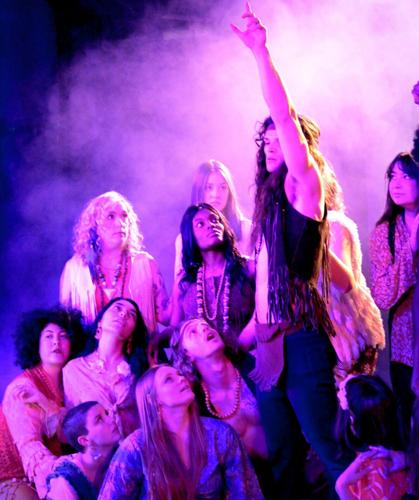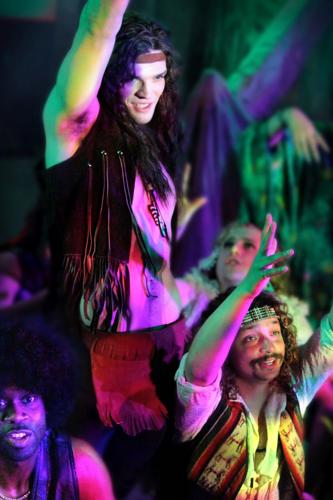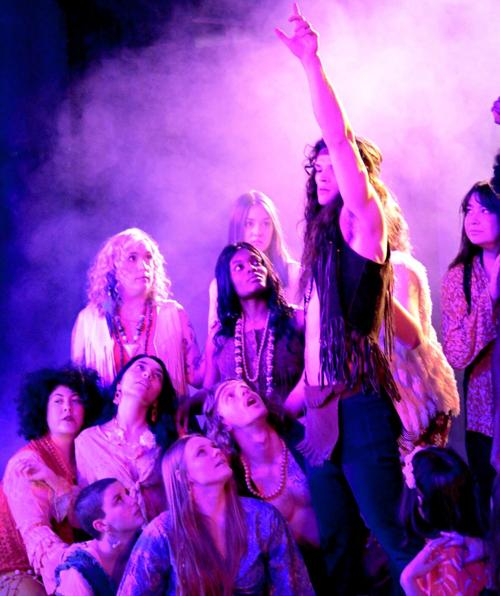Arts Express Theatre is turning the clock back to the late 1960s sex, drugs and rock ‘n’ roll counterculture with its production of the rock musical “Hair.”
But folks in the audience might see a lot of 2024 in the play, which runs March 15-30.
“It deals with issues that provoke and offend absolutely everyone,” said director Nancy Davis Booth. “There’s issues of racism and church and social norms and nudity and all of those things that were so shocking back in 1968 and still shocking today.”
OK, so the audience will probably not be as shocked by the brief nudity at the end of the first act, which Booth said will not include full-on nudity; the theater’s and mall’s liquor licenses prohibit that. The audience will only see performers’ bare backsides during a scene where the “tribe” shows unity and solidarity with Claude as he debates whether to dodge the Vietnam War draft or sign up to serve.
Gerome Ragni and James Rado wrote “Hair” in 1967 based on their observations of the sexual revolution and counterculture movements in late 1960s New York City. Galt MacDermot wrote the music, which included the iconic hits “Age of Aquarius,” “Let the Sunshine In,” “Good Morning Sunshine” and “Hair.”
Set in the late 1960s as the Vietnam War raged, “Hair” follows a tribe of young counterculture hippies whose lives revolve around fighting the establishment. Claude has just received his draft notice, but the tribe tries to convince him to immerse himself instead in their fight for peace, love and community.
The play also deals with identity, politics, drugs and the sexual revolution.
Kinda sounds like today.
“The issues are still the same and that’s why I really wanted to do this production,” said Booth, who has directed 10 productions for Arts Express since her first one in 2018. “Fifty years later we are still dealing with the same issues; nothing’s changed.”
Booth said the cast, most of whom are in their early 20s, “are just thrilled to be part of something that is different from anything they have done in musical theater.”

Set in the late 1960s as the Vietnam War raged, "Hair" follows a tribe of young counterculture hippies whose lives revolve around fighting the establishment.
“Hair,” the first musical to use rock music, delivered a defiant antiwar message at a time when America was deeply divided over the ongoing Vietnam War. The show rattled America’s conscience as it broke with Broadway norms with its frank depictions of drug use, nudity, sexuality and obscenity, all of which will be part of Arts Express’s production.
As the play opens, Booth uses projections of a video loop that depicts 1960s America, from scenes of protestors to images of war, hippies, drug use and the assassinations of Robert F. Kennedy and the Rev. Martin Luther King Jr. The show closes with a video loop showing America today, from scenes of protesting, wars in Ukraine and Gaza and homelessness on America’s streets as the cast sings the finale, “Let the Sun Shine In.” The song becomes a plea for the audience to open their eyes to see that what’s happening today mirrors what happened 50-plus years ago, she said.
“That’s how I brought it back around to being relevant today,” Booth said. “This show is rollicking and fun and full of energy. But on the other side of it there is these moments that just bring tears to your eyes because it’s so poignant. ... The message is uncomfortable and makes us ask questions and makes us have conversations. ... I think theater is a powerful tool for changing behavior and educating people.”
“Hair” is Arts Express’s 12th fully-professional production, said community engagement director Jonathan Crider.
In addition to its professional productions, staged at the company’s theater home at Park Place Mall, Arts Express offers introductory and advanced educational programs.
Gamers know the longtime PlayStation racing series Gran Turismo. The story of Jann Mardenborough, who turned a passion for the game into a career racing real cars was brought to theaters this summer in the film "Gran Turismo." But how closely do these films stick to reality? There's a reason why many include a disclaimer at the start that some characters and stories have been changed or dramatized. We talk about the recently completed HBO series "Winning Time: The Rise of the Lakers Dynasty," which has been criticized by some portrayed on the show. The there is the 1989 film "Great Balls of Fire!" starring Dennis Quaid as Jerry Lee Lewis. A lot of people were critical of the film, but co-host Bruce Miller interviewed Lewis and says the singer loved Quaid's performance.. What about movies like "Elvis" and the upcoming film "Priscilla," which both had the involvement of Priscilla Presley? Or the music biopic that largely led to the modern music biopics, Oliver Stone's "The Doors," which was criticized by the surviving members of the band? Even documentaries have been known to stray a little, such as the Oscar-winning "Searching for the Sugar Man" based on the life of Sixto Rodriguez. The film failed to mention the singer had modest success in Australia, so he wasn't a complete unknown. We take a deep dive into true stories that have been turned into movies and even have an interview with Mardenborough, who was involved with the film. He also talks about his involvement with actor Archie Madekwe, who played Mardenborough. Contact us! We want to hear from you! Email questions to podcasts@lee.net and we'll answer your question on a future episode! About the show Streamed & Screened is a podcast about movies and TV hosted by Bruce Miller, a longtime entertainment reporter who is now the editor of the Sioux City Journal in Iowa and Terry Lipshetz, a senior producer for Lee Enterprises based in Madison, Wisconsin.
Contact reporter Cathalena E. Burch at cburch@tucson.com. On Twitter @Starburch






